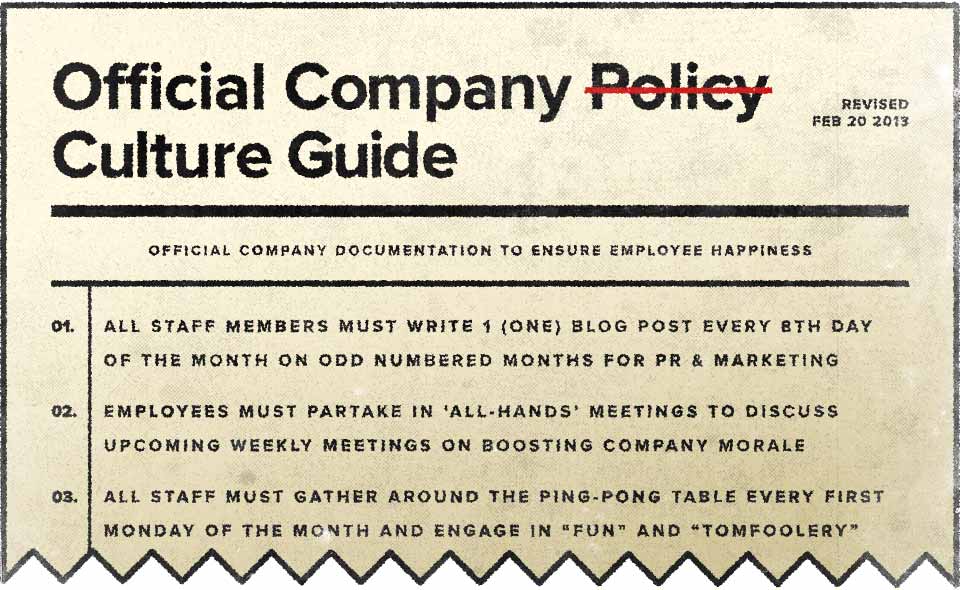
My green thumb is often challenged by the grocery store orchid. I never quite know how much water to give these things. So I was really happy to see this solution recently. The orchid comes with a cup! How much water? This much water. Nicely done.
You’re reading Signal v. Noise, a publication about the web by Basecamp since 1999. Happy !

My green thumb is often challenged by the grocery store orchid. I never quite know how much water to give these things. So I was really happy to see this solution recently. The orchid comes with a cup! How much water? This much water. Nicely done.
There’re 36 signals now, spread across 6 countries. Since we’re remote, we don’t get to see each other that often. We have meetups 2-3 times a year, but I don’t view them that way: they’re reunions. Our first of 2013 was last week. When you don’t get in-person face time with your coworkers every day, seeing each other makes it special, and it’s much more fun.

But tethering the Yahoos to their stalls in the company’s offices does not seem like the right way to go about boosting their output. Plenty of evidence suggests that letting employees work from home is good for productivity. It allows them to use their time more efficiently and to spend more time with their families and less fuming in traffic jams or squashed on trains. It can reduce companies’ costs… You can shackle a Yahoo to his desk, but you can’t make him feel the buzz.
Yahoo has some 11,000 workers. Most estimates put the number of remote workers between 300 and 500. In other words, just 2-4% of the Yahoo work force. That’s a tiny minority!
But that’s exactly why it’s been so easy to place the blame on them for Yahoo’s ails. Minorities make for great scapegoats in all walks of life. If we can just place the blame on this small group of people, then it means there’s nothing really wrong with the rest of us.
Gruber summed up this sentiment as “Yahoo employees have been allowed to work remotely, and they have not excelled”. In other words, Yahoo is a rudderless basket case, so it must be because of those 2-4% of the work force who are “goofing off”. Heh.
Yahoo puts the same blame in their original edict: “To become the absolute best place to work, communication and collaboration will be important, so we need to be working side-by-side”. So yes, remote workers are keeping Yahoo from being the “absolute best place to work”.
What a parody, what a farce.
I hate being late for appointments. I got that from my father. He’s been drilling that punctuality sermon into me since I was young.
My wife, on the other hand, seems to have no problem leaving for a 10am appointment at 9:59am. I love her, but it drives me nuts.
My wife hates being early. I hate being late.
Last night we had a reservation at a restaurant—Geja’s Cafe. Geja’s is located in a congested part of the city. Traffic can be unpredictable. Throw “rush hour” into the mix—I’m thinking of leaving 1 hour before our reserved time.

She wants to stop by her aunt’s house on the way to drop off some Girl Scout cookies. In my head I’m calculating and recalculating that “1 hour” drive time to Geja’s.
While we’re visiting with her aunt I try not to look at the clock so much. That’s rude. But I wonder: how’s the traffic? How can we get there on time?
Then I get a notification on my Android phone.

So we said our goodbyes. Got in the car. Drove to dinner. We got there on time. Everything worked out great. I should worry less.
Fondued (is that a word?) scallops are amazing.
Employees at Yahoo have had a rough decade. The company has been drifting aimlessly with little vision, an endless parade of CEOs, and a flatlined stock price. That’s not exactly a conducive environment to be inspired and motivated within, let alone do the stellar work that Yahoo needs to pull out of the rut.
So it’s no wonder that they’ve been suffering from severe brain drain for a long time. But Yahoo is a big company, and there are surely still lots of talented people who don’t want to leave (or can’t)—waiting for better times. Unfortunately, it appears they’ll be kept waiting, if Yahoo’s announcement of “no more remote work” is anything to go by:
Beginning in June, we’re asking all employees with work-from-home arrangements to work in Yahoo! offices. If this impacts you, your management has already been in touch with next steps. And, for the rest of us who occasionally have to stay home for the cable guy, please use your best judgment in the spirit of collaboration. Being a Yahoo isn’t just about your day-to-day job, it is about the interactions and experiences that are only possible in our offices.
The leadership vacuum at Yahoo is not going to be filled by executive decrees issued on such flimsy foundations. Imagine you’re a remote worker at Yahoo and you read that. Hell, imagine you’re any kind of worker at Yahoo and you read that. Are you going to be filled with go-getter spirit and leap to the opportunity to make Yahoo more than just “your day-to-day job”? Of course not, you’re going to be angry at such a callous edict, declared without your consultation.
What this reveals more than anything is that Yahoo management doesn’t have a clue as to who’s actually productive and who’s not. In their blindness they’re reaching for the lowest form of control a manager can assert: Ensuring butts in seats for eight hours between 9-5+. Though while they can make people come to the office under the threat of termination, they most certainly cannot make those same people motivated to do great work.
Great work simply doesn’t happen in environments with so little trust. Revoking the “yard time privileges” like this reeks of suspicions that go far beyond just people with remote work arrangements. Read this line one more time: “please use your best judgment in the spirit of collaboration”. When management has to lay it on so thick that they don’t trust you with an afternoon at home waiting for the cable guy without a stern “please think of the company”, you know something is horribly broken.
The real message is that teams and their managers can’t be trusted to construct the most productive environments on their own. They are so mistrusted, in fact, that a “zero tolerance” policy is needed to ensure their compliance. No exceptions!
Who cares if Jack is the best member of the team but has to live in Iowa because his doctor wife got placement at a hospital there? Or if Jill simply can’t deal with an hour-long commute anymore and wants to spend more time with the kids? With a zero tolerance policy, there’s simply no flexibility to bend for the best of the team, and thus the company. The result is a net loss.
Now imagine all the people who actually have a choice of where they want to work. Does management really think that the best Yahoo employees currently on remote work arrangements will simply buckle and cave? Why on earth would they do that given the wonderful alternatives available to remote workers today? No, they’re simply going to leave, and only those without options will be left behind (and resentful).
Yahoo already isn’t at the top of any “most desirable places to work” list. A decade of neglect and mounting bureaucracy has ensured that. Further limiting the talent pool Yahoo has to draw from to those willing to relocate to Sunnyvale, or another physical office, is the last thing the company needs.
Companies like Google and Apple can get away with more restrictive employment policies because they’re at the top of their game and highly desirable places to work. Many people are willing to give up the improvements that remote work can bring to their life to be part of that. Yahoo just isn’t there. It’s in no position of strength to be playing hardball with existing and future employees.
The superficial trinkets, like a free phone or free meals at the cubicle compound, are simply not going to serve as adequate passage for a zero tolerance work place that’s still fumbling its way out of a haze of disillusion. In fact, it cheapens those initiatives when the things that really matter, like the power of teams to recruit and retain the best, are curbed.
The timing of all this couldn’t be worse either. Remote work is on a rapid ascent, and not just among hot tech companies like Github, Automattic, or thousands of others. It’s been taking hold in supposedly stodgy big companies like Intel, IBM, Accenture, and many others. Worse than simply being late to that party is to try to turn back the clock and bait’n’switch your existing workforce.
Yahoo deserves better than this. It’s one of the classic brands of the internet and it’s painful to see it continue its missteps, especially on something so fool-hearted as trusting its employees and attracting the best talent.
But if recent history is any guide, I guess Yahoos without options to leave can console themselves with the fact that the average CEO term in the past six years has been a mere one year. So the odds are good that a new boss will be in place within long.
Interested in learning more about remote work? Checkout our upcoming book REMOTE: Office Not Required. It details all our lessons from more than a decade working remotely along with those from the growing list of other companies reaping the same rewards.

Culture offers your staff the company blog’s “publish” button 24/7 so that they can write when their own iron is hot. Policy forces topics and a posting schedule to chip away at the company marketing quota.
Culture inspires your programmers to discover typographic rhythm and scale in their free time. Policy puts a “lunch and learn with designers” meeting on your calendar at 12:00 PM.
Culture nurtures pet projects so that they grow into everyday company tools. Policy steals 20% of your staff’s work hours to gamble on forced research and development.
Culture does.
Policy says.
Culture encourages.
Policy requires.
Culture empowers.
Policy mandates.
Culture simply happens—it isn’t created.

Check it out over here and if you dig it, show Adrian some love and leave him a tip.
I was interviewed on Giant Robots Smashing into Other Giant Robots about Basecamp for iPhone, the recent RubyGems.org security issues, Chemex brewed coffee, and more.
What are you missing due to inattentional blindness? What’s hiding in plain sight in your world that you can’t see?